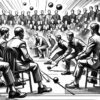imagine meaning
imagine :
to picture, to think of
Verb
▪ She imagined a world without war.
▪ She pictured a world without war.
▪ Can you imagine living on the moon?
▪ Can you think of living on the moon?
paraphrasing
▪ envision – to picture in the mind
▪ visualize – to form a mental image
▪ dream – to think of something in your mind
▪ conceive – to form an idea

Pronunciation
imagine [ɪˈmædʒɪn]
The stress is on 'mag' and sounds like 'ih-maj-in'.
Common phrases and grammar about imagine
imagine - Common meaning
Verb
to picture, to think of
Part of Speech Changes for "imagine"
▪ imagination (noun) – the ability to form ideas in the mind
▪ imaginative (adjective) – full of new ideas
Common Expressions with "imagine"
▪ imagine a future – to picture what is to come
▪ imagine the possibilities – to think of what could happen
▪ imagine a scenario – to picture a situation
▪ imagine the outcome – to think of the result
Important examples of imagine in TOEIC
Vocabulary examples from the TOEIC test
In TOEIC vocabulary questions, imagine is often used to mean forming mental images or ideas.
Example of a confusing word: imagine vs. invent (to create something new)
Grammar examples from the TOEIC test
Imagine is often used as a verb that takes a direct object, often a noun or a gerund, in TOEIC grammar questions.
imagine
Idioms and fixed expressions in TOEIC
imagine a world
'picture a world', often used to discuss hypothetical situations.
beyond imagination
means 'more than you can think of', used to describe something incredible.
Differences between similar words and imagine
imagine
,
envision
differences
Imagine is used for forming mental images or ideas, while envision often involves planning or goals.
Words with the same origin as imagine
The origin of imagine
Imagine comes from the Latin 'imaginari', which meant to form a mental image.
Word structure
It has the prefix im (in), root agin (to form), and suffix e (verb), so imagine means 'to form in'.
Words with the same origin
The root of imagine is agin (to form). Words with the same root include image (a picture), imagery (visual symbolism).






